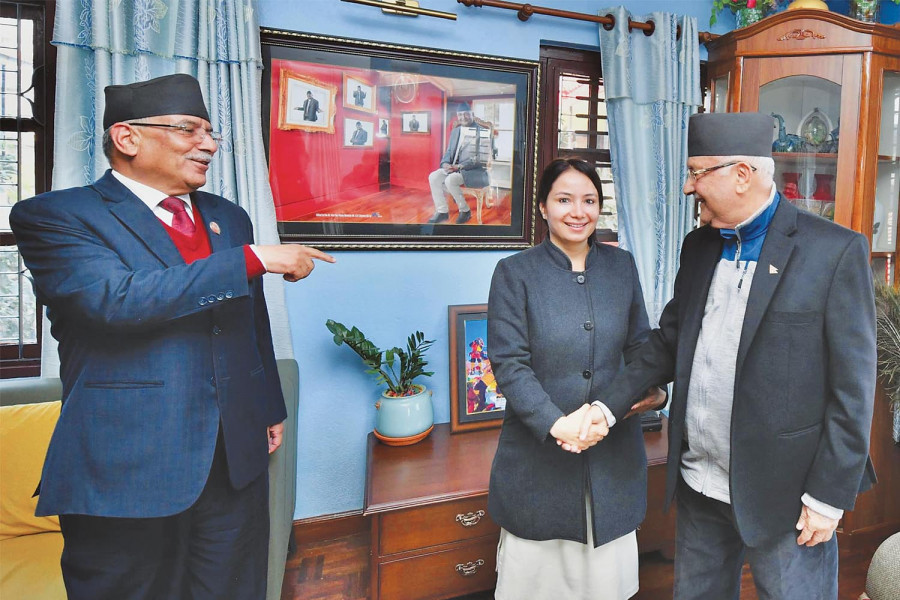Columns
Decay of the party system
Political culture will suffer if parties adopt a nepotistic approach to politics.
Sambridh Ghimire
There has been considerable global debate of late concerning the state of democracy, especially with the global intelligentsia worried about its deteriorating values. Nepal, which has had several trysts with democracy in the past, institutionalised it through its constitution in 2015. Despite these positive developments, the country is still plagued by the global deterioration of democracy. The primary yet ignored aspect in this debacle has been the decline of the party system. This decline is a more significant indication of the fall of democracy than issues such as attacks on individual freedom, manipulation of independent institutions, and lack of transparency in governance.
The way Prime Minister Pushpa Kamal Dahal has been promoting his kin may be seen as normal by some. But those with a longer historical perspective view it as contradictory to the original values of the Nepali Maoists. The CPN-Maoist Centre, as it is called today, was formed through a popular uprising that promoted ethnic communities against the dominant influence of the more affluent Khas Arya community.
While the primary goal of the Maoists was to assert the autonomy of different ethnic and linguistic communities of Nepal and promote self-respect, it also took a more progressive stance on issues of caste and gender than the then-Congress and CPN-UML. The Maoists positioned themselves as a party that promoted ethnic pride and social reform. It was not intended to be a family-run business. However, Dahal did exactly the same. He is also promoting his second daughter Renu Dahal, helping her win the position of Bharatpur mayor.
Hereditary hegemony
The Maoist Centre is not the only party to adopt a nepotistic approach. Nepali Congress has an extended history. For many years after its founding, the party’s main goal was to establish democracy in Nepal. It was only under the leadership of Girija Prasad Koirala that it became a family-run party. Other regional parties, such as the Nagarik Unmukti Party and the Janata Samajwadi Party, have also followed this path. When Prachanda appointed his daughter to his secretariat and his son-in-law to the provincial government, he was most likely influenced by the examples set by his predecessors, who had already given significant appointments to their kith and kin. Even parties like the Janata Samajwadi Party and Rastriya Janmorcha, that claim to be committed to “social justice” have leadership that passes between family members, undermining their professed ideologies.
The trend of family-run parties may not have emerged if the oldest political party in Nepal, the Nepali Congress, had not transformed into a family-run entity under the leadership of Girija Prasad Koirala. The Congress of today bears little resemblance to the party that played a crucial role in Nepal’s democratic revolution. The fundamental difference between the Congress of the past and present is exemplified in the family history of one of its most prominent leaders, BP Koirala. During his tenure, none of his four brothers became Parliament members or ministers. His mother insisted he give Girija Prasad Koirala a ticket during the 1959 parliamentary elections. But he refused, choosing to field Bishwa Bandhu Thapa instead. Unfortunately, this kind of restraint is absent in Nepali politics, not just in the Congress. The succession of kith and kin in the Koirala family—the promotion of Sushil Koirala and Sujata Koirala as political heirs, for instance—encouraged leaders of the Maoist Centre and others to do the same with their kins.
When leaders like Pushpa Kamal Dahal, Sher Bahadur Deuba and Upendra Yadav promote their wives and children in their parties or governments, it sends a message to other members that they will never have the opportunity to rise to leadership positions, regardless of their talents and attributes.
Personality cult
Another aspect of democratic decline is the subordination of parties to a single leader, as exemplified by the CPN-UML under the leadership of KP Sharma Oli. Before Oli’s era, the party did not have a personality cult like it does today. It opposed the “worship of an individual” and claimed that its collective leadership and inner-party democracy set it apart from Girija Prasad Koirala’s Nepali Congress.
The cult of personality surrounding leaders has harmed Nepali democracy. Disturbingly, this trend has begun to influence the operations of other political parties and individuals. When the Rastriya Swatantrata Party was established, it gained significant support for its anti-corruption stance and apparent rejection of entitlement and privilege. However, over time, it has evolved into a tool for the personal aspirations of Rabi Lamichhane. Other leaders of the party similarly defer to him just as other leaders of the CPN-UML defer to Oli. The idea that one person can represent an entire political party or state is also evident in the cults of CK Raut in Madhesh and Resham Chaudhary in Sudurpaschim. The evolution of a personality cult around Balen Shah is also pretty evident, with his supporters attacking his critics.
The degradation of the Nepali party system is nearly complete, with some parties becoming family-run businesses and others quasi-religious cults that exalt their leader as a living god. The far-reaching consequences of this troubling trend have yet to be thoroughly evaluated. Nevertheless, political parties are considered one of the most important institutions in modern society, and the health of democracy is heavily dependent on their functioning well.
If political parties operate within a culture of deference and obedience and mandate family or hero worship, it negatively impacts the broader political culture. If a leader only seeks praise from his or her party colleagues, how will he or she be inclined to receive criticism from the media? If a leader demands unconditional loyalty from party members, he or she will probably require their total support for unlawful acts of policy from the bureaucracy, police, media, or judiciary when in power. This in turn will lead to a further erosion of the democratic process.




 11.12°C Kathmandu
11.12°C Kathmandu















